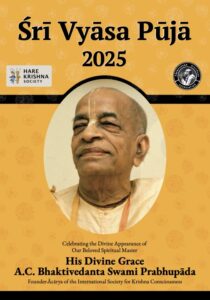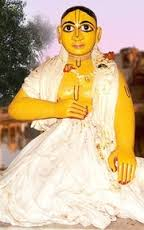By Bhakta Alex

Myth: Srila Prabhupada said that functioning as ritviks during his presence is mere formality, and after his disappearance they would automatically turn into diksa gurus which is the post Srila Prabhupada really appointed them to
Again, Srila Prabhupada didn’t “appoint” anyone there and then during May 28th conversation as diksa gurus but said that the formality, etiquette is that during the guru’s presence his disciples shouldn’t even think of assuming the post of diksa guru. An example of how Srila Prabhupada equated “formality” with “etiquette”:
Satsvarūpa: Prabhupāda, you said that we should respect everyone as a devotee, but then also you teach that…
Prabhupāda: No, no. By qualification, a Vaiṣṇava respects everyone.
Satsvarūpa: But then there’s also a teaching not to respect a nondevotee even if he’s a big man. We may formally offer him respect, but if…
Prabhupāda: That’s all right. Yes. Formality, you should be respectful. Suppose your enemy—that is etiquette-comes in your room. But when he has come to your room, you should offer him respect: “Come on, come on. Sit down.” That is etiquette. You know that “He’s my enemy.” That… The etiquette according to Vedic civilization: gṛhe śatrum api prāptaṁ viśvastam akuto-bhayam. Even your enemy comes at your home, you should treat with him in such a nice way that he’ll forget that you are his enemy. (Room Conversation June 28th 1974, Melbourne)
One part of the etiquette is that one should bring all prospective disciples to his own spiritual master:
Prabhupāda: …the etiquette is, at least for the period the guru is present, one should not become ācārya. Even if he is complete, he should not, because the etiquette is, if somebody comes for becoming initiated, it is the duty of such person to bring that prospective candidate to his ācārya. Not that “Now people are coming to me, so I can become ācārya.” That is avamanya. Nāvamanyeta karhicit. Don’t transgress this etiquette. Nāvamanyeta. That will be falldown. (CC, Ādi-līlā 1.13 class — Māyāpur, April 6th 1975)
“Vidura wanted to accept Uddhava as his spiritual master, but Uddhava did not accept the post because Vidura was as old as Uddhava’s father and therefore Uddhava could not accept him as his disciple, especially when Maitreya was present nearby. The rule is that in the presence of a higher personality one should not be very eager to impart instructions, even if one is competent and well versed. So, Uddhava decided to send an elderly person like Vidura to Maitreya, another elderly person, but he was well versed also because he was directly instructed by the Lord while He was about to quit this mortal world. […] One should not be eager to become a spiritual master cheaply for the sake of profit and fame, but should become a spiritual master only for the service of the Lord. The Lord never tolerates the impertinence of maryādā-vyatikrama. One should never pass over the honor due to an elderly spiritual master in the interests of one’s own personal gain and fame. Impertinence on the part of the pseudo spiritual master is very risky to progressive spiritual realization.” (Srimad-Bhagavatam 3.4.26, purport)
So, here, during May 28th 1977, conversation, Srila Prabhupada immediately adds up that there is second aspect of the etiquette: one needs to receive the order from his/her guru to become the next guru oneself. Srila Prabhupada’s disciples should definitely act on his behalf during his physical presence, it’s not that they were appointed as ritviks for the period of his departure only. No, they were soon to be appointed to immediately start this function. But Srila Prabhupada does NOT state here that the ritvik system should operate ONLY until his physical departure and/or that his disciples will automatically become diksa gurus IMMEDIATELY after his departure. Instead, he emphasizes they should be authorized by their guru in order to become gurus. Quotes and examples:
‘Sri Caitanya-caritamrita’ states:
“Vallabha Bhaṭṭa wanted to be initiated by Gadādhara Paṇḍita, but Gadādhara Paṇḍita refused, saying, “The work of acting as a spiritual master is not possible for me. I am completely dependent. My Lord is Gauracandra, Śrī Caitanya Mahāprabhu. I cannot do anything independently, without His order.” (CC Antya 7.150-151)
“The order of the spiritual master is the active principle in spiritual life. Anyone who disobeys the order of the spiritual master immediately becomes useless.” (CC Adi 12.10)
Prabhupāda: What is the use of producing some rascal guru?
Tamāla Kṛṣṇa: Well, I have studied myself and all of your disciples, and it’s clear fact that we are all conditioned souls, so we cannot be guru. Maybe one day it may be possible…
Prabhupāda: Hm.
Tamāla Kṛṣṇa: …but not now.
Then Srila Prabhupada said that without his order, “Now you become ācārya. You become authorized” — no one can become a guru (initiator), and also noted that apart from authorization it’s necessary to achieve high spiritual qualification, “The training must be complete. ” And the conclusion was made:
Tamāla Kṛṣṇa: Not rubber stamp.
Prabhupāda: Then you’ll not be effective. You can cheat, but it will not be effective. Just see our Gauḍīya Maṭha. Everyone wanted to become guru, and a small temple and “guru.” What kind of guru? (Room Conversation — April 22nd 1977, Bombay)
So anti-ritviks tend to concentrate on one aspect of the etiquette (one shouldn’t become guru in the presence of one’s guru) and misinterpret it by stating it means immediately after Srila Prabhupada’s departure the ritvik system, a supposed mere formality, should be stopped and then ritviks or, as others claim, any disciple could somehow take up the position of the next initiating spiritual master in ISKCON. Although Srila Prabhupada stresses the second part of the etiquette, which is very important: one should get the order, authorization from his own guru to become guru himself.
Maya-GBC’s official anti-ritvik paper “Disciple of My Disciple” desperately claimed that the very words “on my order” are Srila Prabhupada’s actual authorization given to… some unknown circle of future ritviks!
“The present paper will show that on May 28th, 1977, Srila Prabhupada ordered his disciples to become initiating spiritual masters.” (pg. 2)
“The words “on My order” themselves point to the order.” (pg. 8)
Of course, this is wrong interpolation. This is general principle or warning not to become the next guru without Srila Prabhupada’s order, not the order itself to any specific person to become the next initiating guru in ISKCON.
An email from Krishnakant prabhu regarding the discussed section of the May 28, 1977, conversation:
“The conversation is as follows:
Srila Prabhupada: Yes. That is formality. Because in my presence one should not become guru, so on my behalf. On my order, amara ajnaya guru hana, (he is) (be) actually guru. But by my order.
Satsvarupa Goswami: So (then) (they) (they’ll) (may) also be considered your disciples?
Srila Prabhupada: Yes, they are disciples, (but) (why) consider … who
1) Srila Prabhupada is saying that it is a formality that ONE SHOULD NOT BECOME GURU in his presence, SO (it must be done) on his behalf. Which is a fact. One cannot become a Guru in the presence of one’s own Guru just out of formality – one does not need to consider anything else such as qualification etc., because just out of formality one is forbidden.
2) However, Srila Prabhupada does NOT say that RITVIK is only a formality to be observed in his presence. Ritvik is observed because one cannot be Guru – the reason for THIS being formality.
3) Then he goes onto add that BECOMING Guru is NOT a formality, but requires a specific ORDER:
“ON my order … be ACTUALLY guru. BUT by my order.”
4) Thus, without this order – one still cannot be Guru and hence ‘on my behalf’ – ritvik – will obviously still continue.
Thus:
NOT ACT AS GURU IN OWN GURU PRESENCE = FORMALITY –> SO –> RITVIK
NOT ACT AS GURU WITHOUT ORDER —-> SO STILL RITVIK CONTINUES
(From email, August 29th 2003)
Section 4:
9. Satsvarūpa: So, they may also be considered your disciples.
10. Prabhupāda: Yes, they are disciples. Why consider? Who?
11. Tamāla Kṛṣṇa: No, he’s asking that these ṛtvik-ācāryas, they’re officiating, giving dīkṣā. Their… The people who they give dīkṣā to, whose disciple are they?
12. Prabhupāda: They’re his disciple…
13. Tamāla Kṛṣṇa: They’re his disciple.
14. Prabhupāda: Who is initiating. His granddisciple…
15. Satsvarūpa: Yes.
16. Tamāla Kṛṣṇa: That’s clear. (?)
17. Satsvarūpa: Then we have a question concer…
18. Prabhupāda: When I order, “You become guru,” he becomes regular guru. That’s all. He becomes dis… disciple of my disciple. That’s it.
“Tamāla Kṛṣṇa clarifies the question in point #11. Śrīla Prabhupāda’s answer to this question is actually the combination of points #12 and #14. That means he said, “They are his disciples who is initiating”. That means they are Śrīla Prabhupāda’s disciples as he is initiating, using the ṛtviks as his representatives in the ceremony. But halfway through this reply, Tamāla Kṛṣṇa reiterates Śrīla Prabhupāda’s words in point #13. Therefore, Śrīla Prabhupāda’s words appear separated.
Then, in point #14 again, he is mentioning the word ‘grand-disciple’. Satsvarūpa tries to ask another question in point #15 [#17 above] but Śrīla Prabhupāda, in point #16 [#18 above] continues from point #14 that one becomes his grand-disciple only when he orders any of his disciples to become guru. Then he clarifies that they must wait for his order to become what Śrīla Prabhupāda terms as ‘regular guru’. So, the order is not there at the time of this conversation.” (IA77)




